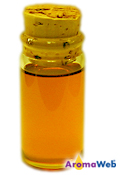Tagetes Essential Oil
Tagetes minuta

Description
Aromatically, Tagetes Essential Oil possesses a fresh, sweet, floral, slightly fruity aroma. I find that it blends well with essential oils in the citrus, floral and wood families.
Tagetes Essential Oil is extremely phototoxic. As Robert Tisserand and Rodney Young indicate (see the Safety section below), it must be used at under 0.01% in topical formulations to eliminate the risk of phototoxicity.
Tagetes is a variety of marigold. It should not be confused with the marigold that gives us Calendula and healing Calendula infused carrier oils. Both have very different properties and very different applications.

Tagetes Essential Oil Benefits and Uses
- Corns
- Warts Athlete's Foot
- Corns
- Calluses
- Bunions
- Parasitic Infestations
- Resistant Fungal Infections
Sources: Valerie Ann Worwood, The Complete Book of Essential Oils and Aromatherapy, 25th Anniversary Edition (Novato, CA: New World Library, 2016, 624. Julia Lawless, The Encyclopedia of Essential Oils (Updated Edition) (London: Harper Thorsons, 2014), 187-188.
Botanical Name
Plant Family
Common Method of Extraction
Steam Distilled
Plant Part Typically Used
Color
Gold
Consistency
Thin - Medium
Perfumery Note
Top
Strength of Initial Aroma
Medium
Aromatic Description
Tagetes Essential Oil smells fresh, sweet, floral and slightly fruity.
Major Constituents of Egyptian Tagetes Oil
- (Z)-B-Ocimene
- Dihydrotagetone
- (Z)-Tagetone
- (Z)-Tagetenone
- (E)-Tagetenone
See Essential Oil Safety for more complete list of typical constituents.
Source: Private Communication: Fakhry, 2002. Source cited in Robert Tisserand and Rodney Young, Essential Oil Safety (Second Edition. United Kingdom: Churchill Livingstone Elsevier, 2014), 435.
Tagetes Essential Oil Safety Information
Tagetes Oil is phototoxic. Tisserand and Young recommend a dermal maximum of 0.01% to avoid risk of phototoxic reaction. Reading Tisserand and Young's full profile is recommended. [Robert Tisserand and Rodney Young, Essential Oil Safety (Second Edition. United Kingdom: Churchill Livingstone Elsevier, 2014), 435-436.]
General Safety Information
Do not take any oils internally and do not apply undiluted essential oils, absolutes, CO2s or other concentrated essences onto the skin without advanced essential oil knowledge or consultation from a qualified aromatherapy practitioner. For general dilution information, read AromaWeb's Guide to Diluting Essential Oils. If you are pregnant, epileptic, have liver damage, have cancer, or have any other medical problem, use oils only under the proper guidance of a qualified aromatherapy practitioner. Use extreme caution when using oils with children and be sure to first read the recommended dilution ratios for children. Consult a qualified aromatherapy practitioner before using oils with children, the elderly, if you have medical issues or are taking medications. Before using this or any essential oil, carefully read AromaWeb's Essential Oil Safety Information page. For in-depth information on oil safety issues, read Essential Oil Safety by Robert Tisserand and Rodney Young.
Shelf Life
Important Information About the Profiles
The essential oil information provided on AromaWeb is intended for basic educational purposes only. The references to safety information, test results, constituents and percentages is generalized information. Essential oils can vary greatly in composition. The data is not necessary complete and is not guaranteed to be accurate. The essential oil photos are intended to represent the typical and approximate color of each essential oil. However, essential oil composition and color can vary based on harvesting, distillation, age of the essential oil and other factors. Profiles for several CO2 Extracts and absolutes are included within the directory, and are denoted as such.
